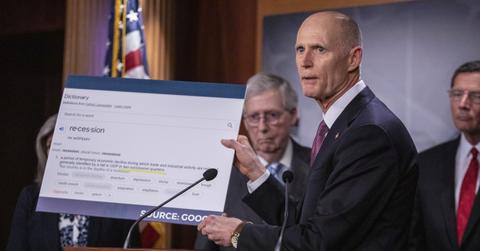Latest Job Numbers May Be an Important Piece to Determining a Recession
The job report for July comes out on Aug. 5, and many are anticipating the numbers because they could signal an official recession.
Aug. 4 2022, Published 2:13 p.m. ET

Senator Rick Scott holding up a sign with the definition of a recession on it
The GDP rate is one of the leading indicators to help determine if the U.S. economy is in a recession. It measures the market value of all the goods and services produced in the country. After the rate fell for a second straight quarter, the U.S. didn't declare that the country is in a recession. Will July’s job numbers determine whether or not we’re in a recession?
In the past, two consecutive quarters of the GDP rate falling meant that the economy was in a recession. However, U.S. officials and the Federal Reserve refuted any accusations of a recession. President Biden and his administration have raved about the job market and how there are many jobs for people and unemployment has fallen. Is the administration just denying the inevitable?

Do the latest job numbers mean we’re in a recession?
The latest job numbers won’t be the deciding factor to determine whether or not we’re in a recession, but they're an important factor. The number of job openings reportedly dropped in June to 10.7 million compared to the 11.3 million in May, which makes it the lowest levels of openings since nearly a year ago. While layoffs slowed down in June, hiring slowed down, which experts say is a sign of recession fears from employers.
While there are concerns about the job market in the future, workers are increasingly quitting their jobs in search of new ones. In earlier months, it wasn’t uncommon for employees to quit their current job and look for higher-paying jobs. Now, that tactic is significantly more risky with job openings expected to continue to decrease and confidence in the job market slims.
Those who quit their job are more likely to take the first offer they receive, even if it’s under their pay expectations. Companies of all sizes have been rescinding job offers or implementing hiring freezes because of the uncertain economic climate. Since unemployment hasn't changed significantly over the past few months, there are mixed signs of whether this job market is preluding to a recession.
How will the July job numbers impact chances of a recession?
The July employment statistics will be released on Aug. 5, and while they may not necessarily make or break the chances of a recession, the numbers can play a huge role in the stock market. The July non-farm payrolls (NFP) report will be released early on Aug. 5 and it typically causes significant volatility in financial markets across the world.
What makes the July NFP so significant is that many stocks have been up in share prices for the first time in months. If a negative report comes out, the short-term bull run may be short lived and the bearish market we’ve seen for most of 2022 would continue.
Who determines if we’re in a recession?
The National Bureau of Economic Research (NBER) determines the start and end of a recession. The NBER is a private nonprofit organization composed of the country’s best economists. While jobs are an important factor on their reports, consumer spending, salaries, job growth, and industrial production are all of the other pieces that the NBER uses to determine the start or end of a recession.
